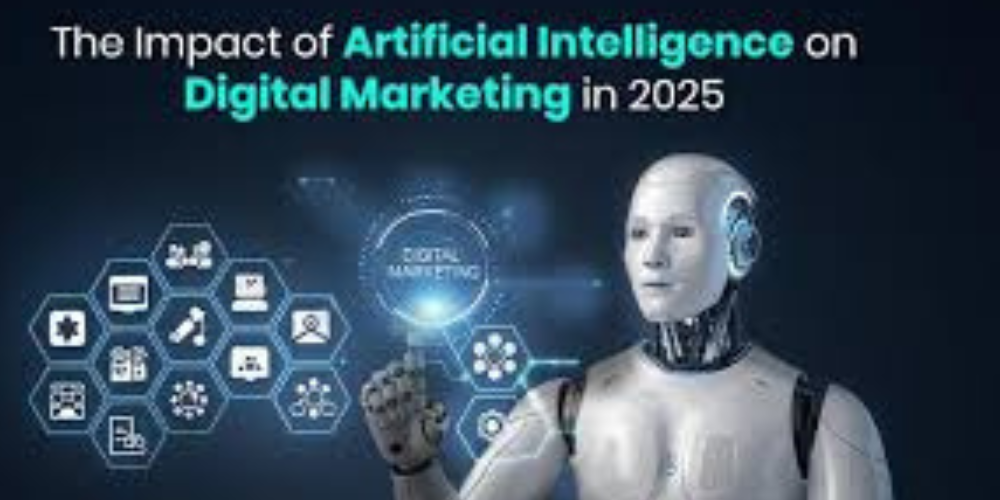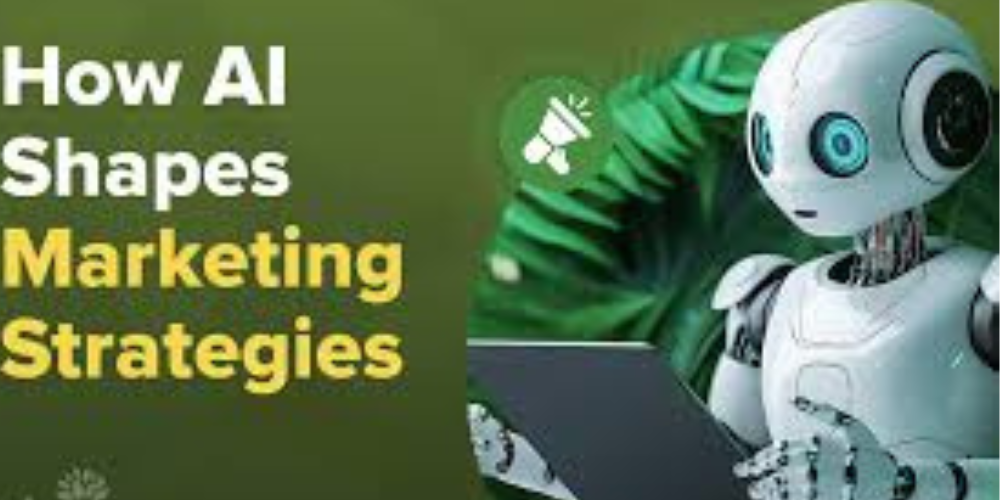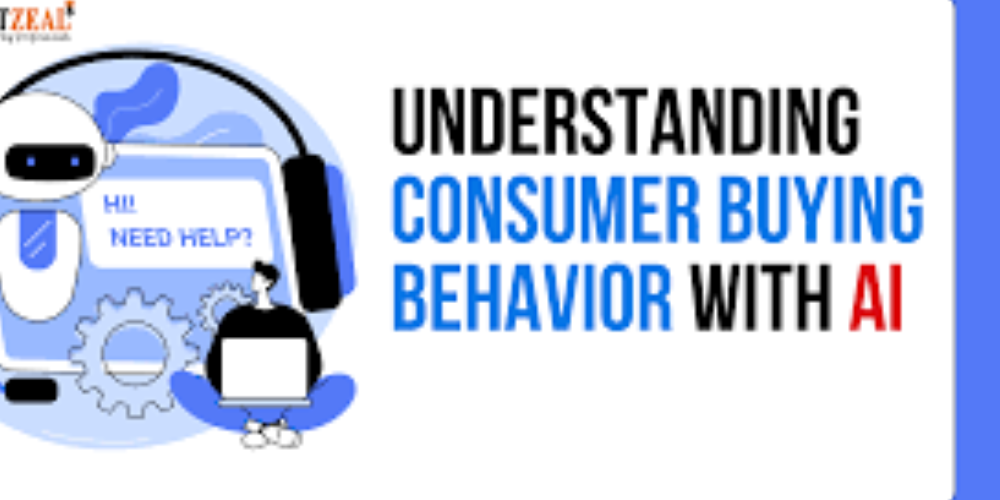
INTRODUCTION OF ARTIFICIAL INTELLIGENCE IN DIGITAL MARKETING
Artificial Intelligence (AI) is transforming the way businesses connect with customers in the digital marketing landscape. By leveraging AI-powered tools such as chatbots, predictive analytics, and smart content optimization, marketers can deliver personalized customer experiences, data-driven strategies, and improved targeting. From automated campaigns to consumer behavior prediction, AI helps brands boost engagement, maximize ROI, and stay competitive in the ever-evolving world of digital marketing.
WHAT IS AI AND ITS IMPORTANCE
Artificial Intelligence (AI) is the simulation of human intelligence in machines that are programmed to analyze data, learn patterns, and make decisions. AI uses machine learning, natural language processing, and predictive analytics to perform tasks such as problem-solving, automation, and personalization. In the digital marketing landscape, AI helps brands improve customer engagement, campaign optimization, and data-driven strategies, making it a powerful tool for modern businesses.
Artificial Intelligence (AI) is revolutionizing digital marketing by helping businesses make smarter, data-driven decisions. AI enables marketers to deliver personalized customer experiences, predict buying behavior, and optimize campaigns with greater accuracy. With tools like AI-powered chatbots, predictive analytics, and automated content creation, brands can improve customer engagement, lead generation, and ROI. In today’s competitive landscape, the importance of AI in digital marketing lies in its ability to enhance efficiency, reduce costs, and create highly targeted marketing strategies that drive measurable results.
HOW AI IS RESHAPING DIGITAL MARKETING STRATEGIES IN 2025
RESHAPING OF STRATEGIES BY AI IN 2025

In 2025, Artificial Intelligence (AI) is playing a crucial role in reshaping digital marketing strategies by driving hyper-personalization, predictive analytics, and automation. Marketers are using AI-powered marketing tools to analyze consumer data, optimize ad targeting, and create personalized content at scale. From voice search optimization to AI-driven chatbots and customer journey mapping, AI is enabling brands to stay ahead in a highly competitive digital landscape. Businesses that embrace AI in digital marketing are not only improving customer engagement but also achieving higher ROI and long-term growth.
AI-POWERED DATA ANALYTICS
AI-powered data analytics is transforming the way businesses understand and leverage information in the digital marketing landscape. By using machine learning algorithms, predictive analytics, and real-time data processing, AI enables marketers to uncover hidden patterns, predict customer behavior, and optimize marketing strategies. With AI-driven insights, brands can make faster, smarter, and more accurate decisions to improve customer targeting, campaign performance, and ROI. This makes AI-powered analytics a crucial tool for businesses aiming to stay competitive in 2025 and beyond.
REAL TIME CONSUMER INSIGHTS
Real-time consumer insights powered by Artificial Intelligence (AI) are helping businesses understand customer needs and behavior instantly. By analyzing data from social media, online interactions, and purchase patterns, AI enables marketers to make quick, data-driven decisions. These insights allow brands to deliver personalized customer experiences, targeted marketing campaigns, and improved engagement at the right time. Leveraging AI-driven real-time insights ensures that businesses stay agile, respond to market changes faster, and maximize digital marketing ROI.
HOW AI HELPS IN PREDICTING CONSUMER BEHAVIOUR
AI helps in predicting consumer behavior and patterns by analyzing large volumes of data, identifying hidden trends, and generating actionable insights. Here’s how it works:

AI helps in predicting consumer behaviour and patterns by analyzing large volumes of data, identifying hidden trends, and generating actionable insights. Here’s how it works:
1. Data Collection & Integration
AI gathers data from multiple sources like purchase history, browsing activity, social media interactions, feedback, and even real-time location. This helps in building a 360-degree consumer profile.
2. Pattern Recognition
Using machine learning algorithms, AI detects recurring behaviors such as preferred shopping times, frequently purchased products, or brand affinities. For example, an e-commerce site can predict which items a user is likely to buy next.
3. Personalized Recommendations
AI analyzes past interactions and compares them with similar customer segments to provide personalized product suggestions, increasing the chances of conversion.
4. Predictive Analytics
Through predictive modeling, AI can forecast future behavior — like churn probability, next purchase, or spending capacity — helping businesses plan targeted campaigns.
5. Sentiment Analysis
By analyzing reviews, comments, and social media posts, AI gauges consumer sentiment (positive, neutral, negative), predicting how customers might react to future products or marketing campaigns.
6. Real-time Insights
AI systems monitor live customer activity and adapt in real-time, such as adjusting pricing, offering instant deals, or optimizing ad placements.
7. Market Segmentation
AI clusters consumers into micro-segments based on lifestyle, preferences, and purchase patterns, making marketing strategies more precise.
PERSONNALISÉD CONSUMER TARGETING WITH HELP OF AI
Artificial Intelligence (AI) has revolutionized the way businesses approach personalized marketing and consumer targeting. By analyzing customer data, purchase history, browsing behavior, and real-time interactions, AI enables brands to deliver tailor-made experiences that improve engagement and conversions.
Personalized Recommendations
.AI-powered algorithms track customer activity to provide personalized product recommendations. This enhances customer experience by showing users products they are most likely to buy, increasing sales and customer loyalty.
Predictive Consumer Targeting
Through predictive analytics, AI can forecast future buying behavior and segment audiences into micro-groups. This allows businesses to create targeted marketing campaigns and send relevant offers at the right time.
Real-Time Personalization
AI tracks consumer actions in real-time, enabling brands to adjust pricing, promotions, and content instantly. For example, AI-driven personalization can change website content based on a visitor’s location, interests, or device.
Behavioral Insights for Targeting
AI analyzes consumer behavior patterns such as purchase frequency, preferred channels, and engagement levels. These behavioral insights help marketers target the right audience with precision, reducing ad spend wastage.
Omnichannel Personalization
AI enables brands to provide consistent personalized experiences across multiple channels — email, social media, websites, and mobile apps. This boosts engagement and brand trust.
HYPER PERSONNALISÉD ADDS AND CONTENT
AI plays a vital role in creating hyper-personalized ads and content by analyzing consumer data, predicting behavior, and delivering tailored experiences across digital platforms. Instead of generic messaging, AI ensures that every consumer receives content, offers, and ads that resonate with their individual preferences.
1. Advanced Consumer Data Analysis
AI collects and processes vast amounts of data, including browsing history, social media activity, location, and past purchases. By identifying unique patterns, AI enables brands to design hyper-personalized ad campaigns that match customer interests.
2. Dynamic Content Creation
AI tools generate personalized content in real-time, such as customized email subject lines, tailored landing pages, or dynamic website banners. This ensures customers receive relevant messaging at every touchpoint.
3. Predictive Ad Targeting
Using predictive analytics, AI anticipates what a customer is likely to need next. This allows businesses to deliver targeted ads with product suggestions or promotions that feel timely and personal.
4. Real-Time Ad Optimization
AI continuously monitors campaign performance and consumer responses. It then automatically adjusts ad copy, visuals, or placement to maximize engagement, making ads feel more personal and effective
5. Personalized Video & Interactive Content
AI enables creation of personalized videos, chatbots, and interactive ads that address customers by name or suggest products based on their browsing behavior. This level of personalization builds stronger emotional connections.
ROLE OF RECOMENDED ENGINES IN DIGITAL MARKETING
Role of Netflix as an AI Tool in Transforming Digital Marketing

Netflix is one of the best real-world examples of how AI in digital marketing can transform customer experiences and brand growth. By leveraging artificial intelligence and machine learning algorithms, Netflix continuously analyzes user data, including watch history, search behavior, and engagement patterns, to create personalized recommendations. This not only improves customer targeting but also enhances audience segmentation, ensuring that every subscriber receives highly relevant content suggestions.
From a digital marketing perspective, Netflix showcases how AI-driven personalization can boost customer engagement, reduce churn, and strengthen brand loyalty. Its use of predictive analytics and real-time consumer insights demonstrates the power of AI in shaping personalized marketing campaigns. Netflix’s success has set a benchmark for businesses to adopt AI tools in digital marketing for creating hyper-personalized experiences and achieving higher ROI.
AMAZON

Amazon is a leading example of how AI in digital marketing transforms the way brands connect with consumers. Using artificial intelligence and machine learning algorithms, Amazon collects and analyzes vast amounts of customer data—such as purchase history, browsing behavior, and search intent—to deliver personalized product recommendations. This not only improves audience segmentation but also drives customer targeting with high precision.
Through AI-powered predictive analytics, Amazon anticipates consumer needs, suggests relevant products, and optimizes pricing strategies. Its recommendation engine is a prime illustration of how AI-driven personalization increases customer engagement, boosts conversions, and builds long-term loyalty.
From a digital marketing perspective, Amazon shows how businesses can leverage AI tools for real-time consumer insights, hyper-personalized campaigns, and data-driven decision-making. The company’s innovative use of AI has set global benchmarks for customer experience management, making it a model for the future of AI-powered marketing strategies.
HOW AI HELPS IN IMPROVING AUDIENCE SEGMENTATION
AI plays a crucial role in audience segmentation by analyzing massive amounts of consumer data and identifying hidden patterns that traditional methods often miss. Through machine learning algorithms and predictive analytics, AI can group customers based on demographics, behaviors, interests, and purchase intent. This leads to more accurate audience profiling and sharper customer segmentation strategies.
AI-powered tools also track real-time consumer behavior, such as browsing history, engagement rates, and buying patterns, to create dynamic audience segments. This enables businesses to deliver personalized marketing campaigns, improve customer targeting, and increase conversion rates.
By using AI in audience segmentation, brands can move beyond generic categories and build micro-segments, ensuring hyper-personalized customer experiences and higher ROI in digital marketing.
AI-GENERATED BLOGS, AD COPIES, AND SOCIAL POSTS
AI-GENERATED BLOGS
The use of AI in blog generation is transforming digital content creation by making it faster, smarter, and more efficient. With the help of AI writing tools, businesses and creators can generate high-quality blog posts that are engaging, SEO-friendly, and tailored to specific audiences. AI analyzes trending topics, keywords, and audience behavior to create personalized blog content that drives traffic and boosts online visibility.
By leveraging AI-powered blog generation, writers can save time on research, content structuring, and keyword optimization. AI ensures consistency in tone, eliminates errors, and enhances readability, making it easier to publish optimized blogs that rank higher in search engines. Moreover, AI can provide real-time content suggestions, improve content personalization, and adapt blogs to match brand voice and consumer needs. In today’s digital marketing landscape, the use of AI in content creation not only increases productivity but also improves audience engagement, making it an essential tool for businesses aiming to grow online.
AI-GENERATED AD COPIES
The use of AI in ad copy generation is transforming digital marketing by helping businesses create high-performing ad copy that captures attention and drives conversions. With the help of AI ad copywriting tools, brands can generate compelling Google ads, Facebook ads, Instagram captions, and PPC campaigns in just seconds. AI analyzes consumer data, search trends, and audience behavior to craft personalized ad copy that resonates with the target market.
By leveraging AI-powered ad copy generation, marketers save time, reduce trial-and-error, and optimize campaigns for better ROI. These tools also ensure SEO and keyword optimization, making ads more discoverable while maintaining a persuasive tone. From dynamic ad headlines to tailored product promotions, AI helps businesses deliver the right message to the right audience at the right time.
In today’s fast-paced digital landscape, the use of AI in advertising empowers brands to create impactful, data-driven campaigns that improve customer engagement, click-through rates, and sales conversions.
THE USE OF AI IN SOCIAL POSTING
The use of AI in social posts is revolutionizing the way brands connect with their audience on platforms like Facebook, Instagram, LinkedIn, and Twitter (X). With the help of AI social media tools, businesses can create personalized, engaging, and high-performing social content that increases reach and visibility. AI analyzes audience behavior, trending hashtags, and content performance to generate social media posts that are relevant, timely, and impactful.
By leveraging AI-powered social media marketing, brands can schedule posts, optimize captions, design visuals, and even predict the best posting times to maximize engagement. AI also ensures content personalization, helping marketers deliver posts that resonate with specific audience segments.
In today’s competitive digital world, the use of AI in social media helps businesses save time, improve creativity, and boost brand awareness, customer engagement, and conversions across all platforms.

